The Great
“Super-Learning” Hoax

Tom O'Connor
Dear Friend,
With growing concern I’ve noticed more and more hard-working and talented people are getting duped into the great “super-learning” hoax.
Being told the thing that will change our lives is reading more books, consuming more courses and passively absorbing the ideas of others. That somewhere out there … is the key to your success if only you could find it.
To be fair, I can see why so many people believe this.
For a long time self-help gurus and YouTube creators have cherry picked the lowest fruit, the visible behaviours of the world’s most successful people and proclaimed “Look over here, these are the 10 habits all successful people do.”
And they focus on the WORDS of wildly successful people like…
"I spend a lot of time reading."
- Bill Gates
"I just sit in my office and read all day."
- Warren Buffet
"I think most people can learn a lot more than they think they can.
They sell themselves short without trying."
- Elon Musk
Leading people to (mistakenly) conclude that reading is the key skill to these super successful people’s success. When reading is a tiny fraction of the real story.
Reading is just the INPUT side of the equation. What really played a critical role in their success, as Charlie Munger puts it is “becoming a learning machine.”
And so there are many blog posts, YouTube videos, and podcasts episodes on highlighting these visible things.
That’s why tens and thousands of new books and courses are published each year with the promise to teach you a new skill -- whether it’s on coaching, selling, dating, or parenting.
There’s a big market for that. (Last time I checked, it was in the Billions).
A market that profits from teaching you…
...how to present like Steve Jobs.
...how to invest like Warren Buffett.
...how to build companies like Elon Musk.
...how to sing like Beyonce (as if that’s possible!)
Which begs the question...
If millions study these
success secrets...
...why do they have very little
(or NOTHING at all) to show to
their families and friends?
And, worst of all:
Why do these lifelong learners start to doubt themselves despite investing more time, money, and energy into themselves compared to almost anyone they know?
I don’t know about you…
...but I found myself asking this question a lot.
I started searching for answers.
And I was NOT satisfied with commonly accepted answers like “It’s the knowing vs. doing gap.”
Yes there is always going to be a knowing vs doing gap, but that alone isn’t enough to explain what is going on.
So I dug deeper and deeper. I started looking at popular culture, documentaries like Fyre, We Crashed and my personal favourite at the moment:
Hit TV Show:
The Drop Out
Captures The Problem Well
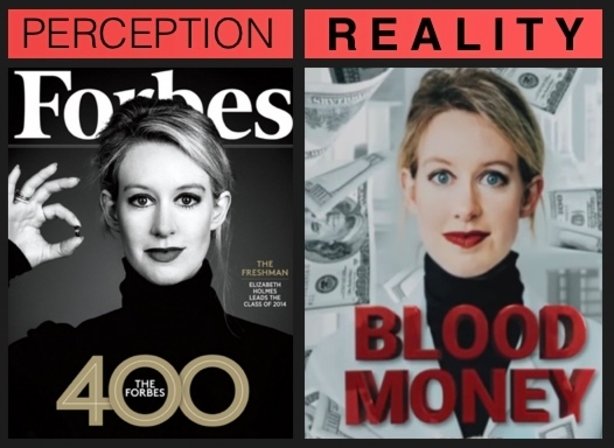
As I was watching The Drop-Out on Hulu, I couldn’t help but think:
“This is very much like whole sections of the personal development industry today.”
If you haven’t seen ‘The Drop Out’, it’s the story of Elizabeth Homes who promised the world a medical revolution. At 19 she claimed to invented a miniaturised machine that with a single drop of blood could diagnose your health problems. She boasted serious health problems like cancer could be prevented before they ever happen. And went on to build a company worth $4.5 BILLION on that perception.
Only problem was, the whole thing was built on a BIG LIE. Her famous machine couldn’t do a fraction of what she promised.
The two pictures above capture accurately what happens when people can’t see the gap between a finely crafted perception and the actual reality of what is really going on…
Unfortunately, this huge mismatch between perceptions and actual reality has a LOT in common with what’s happening in the “personal development” industry today.
The Reality is...
“Today, there are more courses
that are pumped into the market on
how to sell a course than how to create a course that delivers results.”
Acquiring customers has become more important than serving them.
Just think about it:
There are internet marketers out there who are proud of teaching other people “the art of selling an ideal future (aka. “their upcoming course”) even BEFORE creating the outline of the course.
They don’t care whether the course will deliver or not.
They just teach others how to market a course.
And here’s where the big problem starts...
Their marketing message and packaging is now so shiny,
you need Superman’s X-Ray vision
to see whether it’s something worth your time and attention.
Without having that “X-Ray vision” built-in…
Most success-oriented people follow the advice of greats like Bill Gates, Elon Musk, Oprah Winfrey or Warren Buffet on the importance of reading and learning…
...and still find themselves living in a loop…
...going around and around…
...repeating the same old unworkable behaviours…
...hoping for different outcomes in their personal and business lives.
They find themselves continuously dreaming a better future... for themselves... and for their families.
A future that they want... but don’t have… feeling incredibly stuck.
Over time, the drip-drop of continuously wanting but not having...
...of trying but not succeeding
...of aspiring, yet time and time again, never truly achieving their expectations or what they are capable of...
...begins to eat into their confidence.
And it affects how others begin to see them.
It damages their energy... their goals... even their relationships with their friends, family and spouse.
And that’s when the problem gets even bigger...
This continuous wishing, hoping, and wanting leaves them with a worried mind.
A worried mind that tries to calm itself with more information…
...which usually means reading more, studying more, watching more…
...with the hope to get out of that vicious circle...
...which actually keeps them even more stuck in the loop.
Saying this is not going to make me any popular, but I have to say it:
The personal development
industry is fueled by that circle...
a circle of continuous wishing,
hoping and wanting…
and searching for books, courses,
and videos for a way to get
out of that circle.
It’s like getting thirsty…
...and drinking a glass of salty water...
...WITHOUT realising the glass is filled with salty water.
After drinking so many glasses of salty water, drinking salty water feels normal.
And since they lack the X-ray vision to see what is really in the water, they keep getting thirstier and thirstier, and they keep drinking the salty water.
That metaphorical “thirst” for more information, more books, and more courses keep millions of “growth mindset” people stuck.
So, you may be wondering…
What’s the solution?
What’s the way to get out
of that vicious circle?
Taking a page from some of the high-achievers of our generation…
…who are also known to be voracious readers and lifelong learners…
I can confidently say this:
The solution is NOT burning all your books and deleting all your courses -- after all, there’s a reason why so many top-performers believe in continuous learning.
Instead…
The solution is taking
a different stance on
how you learn.
And, in case you’re wondering…
I’m NOT talking about speed reading, memory pegs, mental math or any other so-called “super-learning” tactics.
I’m NOT even talking about NLP based “accelerated learning” strategies and techniques that help you encode, retain and access information quicker.
I’m talking about…
...enhancing how you learn…
...by adjusting your perception filters…
...and bringing CLARITY to everything you read, watch, and study.
I’m talking about…
...looking at the world with
state-of-the-art “X-ray vision”...
With such an X-ray vision…
You can easily identify the models of excellence and exemplars all around you.
People who are brilliant at doing some of the skills that you’ll need to achieve your desired goals…
...yet you normally have no idea what they're doing in their minds to get those results.
And, now, thanks to your X-ray vision like abilities…
...you get a clear enough view on the patterns that they use behind-the-scenes.
So that you’ll replicate those results in your own life -- even if you don’t share some of their beliefs or even if it looks like you don’t have all the advantages that they have.
Sounds intriguing?
This is just the beginning.
With such an X-ray vision…
You call also get a better view of your exemplar's process (including his or her own bottlenecks and inefficiencies), remove the unnecessary parts from the model, and achieve even better results than your model of excellence.
And that’s NOT all…
You don’t necessarily need to have an in-person exemplar to put your X-ray vision skills into practice.
You can use the very same skills the next time you read a book, listen to a podcast, watch a YouTube video, or study a course.
I understand if this “X-ray vision” ability and what it can do for you sounds a little out there (or something elusive that only true geniuses could utilise).
But let me assure you:
It’s NOT rocket science.
Yet…
It’s definitely a lost art.
A lost art that
very few people know.
A lost art that Michael Breen has been practising and refining for over three decades.
And in case you're new to NLP Times or you don't know this detail about Michael...
Michael is not only one of Britain’s leading executive consultants, he’s also a renowned NLP modeler in the corporate world.
He's the guy many corporations have called on when they needed to model specific skills from the best of the best.
He's been hired to model world-class performers -- across many different domains -- people who in their own areas are incredibly successful at what they do.
Yet, few people in the NLP community know about Michael's professional modeling work.
Why?
Because his clients are large multi-million dollar and multi-billion dollar companies.
Not only has everyone from huge multinational clients to fabulously wealthy investors to business leaders have turned to Michael to create models of exceptional performers...
...they also have called Michael when they were pressed to clean up the mess of modeling projects that go wrong that were run by others.
Of course, when corporations compete at the top levels on the global stage, they don't want their competition to know how they are deploying their advantages...
So Michael's always been very closed lipped about his modeling work.
Until now.
Michael will *finally* be revealing his closely-guarded secrets on this lost art of behavioural modelling and artful skill acquisition.
Meet Your Instructor - Michael Breen
ONE OF NLP’S MOST ACCOMPLISHED & HIGHEST PAID
PROFESSIONAL MODELERS WORKING TODAY.
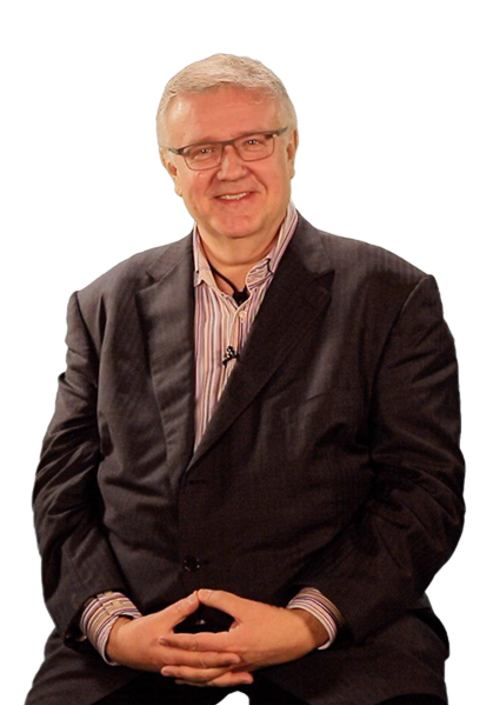
Michael has:
INTRODUCING
C.I.T.A.D.E.L.
An Introduction To The Lost Art Of Behavioural Modeling & Artful Skills Acquisition
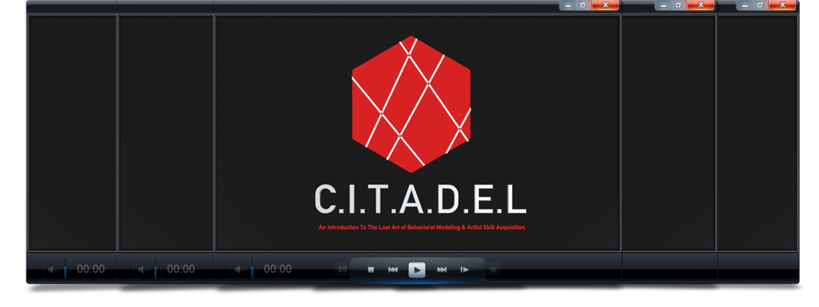
This truly is the “missing masterclass” on NLP modelling.
And its unusual title is just a little reflection of how unordinary this new program is.
C.I.T.A.D.E.L. takes its name from these seven steps:
- Clarify Your Desired Goal
- Identify The Model of Excellence
- Test Your Assumptions, Outcomes & Outputs
- Access & Observe The Model of Excellence In Action
- Detect & Distinguish The Pattern
- Eliminate The Non-Essential
- Link Up The Learning Transfer
Seven steps that are put together as a complete system for the first time ever in NLP history.
A complete system I’ll refer to as C.I.T.A.D.E.L.
C.I.T.A.D.E.L. is the training I wished was available when I first started exploring modeling and NLP.
It would have saved me so much time, money, trials and errors.
While I can’t change the past, I’m hopeful for the future...
Here’s why:
Thanks to C.I.T.A.D.E.L., you don’t have to go down all the cul-de-sacs and wrong roads (and lies) that abound around behavioural modeling and rapid skill acquisition.
In one intensive program, you’ll have everything you need to make a massive leap forward in how you learn and how you model others. (At last!)
Starting with:
MODULE #1:
Modeling Fundamentals
(Or What No One Taught You)
“NLP Modeling” is a very misunderstood topic, and for good reason.
For decades, students of NLP have heard legendary stories about modeling. (U.S. Army Pistol project, anyone?)
The formula for success, repeated in book after book, has always been…
“1. Find a way to model those who have already succeeded.”
“2. Do what they do, get the same result.”
But HOW?
How do can one model and get the same success?
Even today, 40 years on from the first models created in NLP, the practical details and foundational skills about how to model are lacking, inaccurate, or incomplete.
Leaving students of the field with far more questions than answers!
(And believing a whole bunch of things that simply aren’t useful.)
In Module #1, we begin by covering the essential big ideas about modeling you need to know. Michael shows you why so many commonly accepted ideas that you’ve been told about modeling are wrong and gets you pointed in the right direction…
You’ll learn:
MODULE #2:
Misconceptions, Myths & Misunderstandings
(That Confuse, Distract & Disorient)
Modeling is not copying nor is it a list of meta-programs, beliefs and strategies.
Let Michael take you by the hand and show you how to navigate the misconceptions, myths and misunderstandings about behavioural modeling so you can create the outcomes you want with greater ease.
You'll learn:
MODULE #3:
Secrets Of Selection
How To Identify True Outliers
The world is full of people who are exceptional at producing specific outcomes. From A to Z, there are potential exemplars everywhere.
But that’s not all…
There are rich resources of excellence that have been coded around how excellence happens that people imagine.
Unfortunately, most people don’t know how to identify outliner behaviour, or how to spot it.
But you will when you learn…
MODULE #4:
Must-Have Modeling Tools,
Techniques & Frameworks
Part 1 - Skills & Attitudes
NLP is chocked full of tools and techniques that one can use to model… or give the impression that modeling is occurring.
But long before you pick up any model tools or frameworks, you need to master the skills and attitudes that transform what you can do as a modeler.
It all begins with teaching yourself new ways of observing and seeing what others miss - something cognitive frameworks don’t provide.
Each of us has on-board the ability to learn by watching and doing. It’s what we used as our primary tools of learning as kids, however as people grow older they’ve prioritised a cognitive understanding of the world, in place of observation and seeing what is actually going on. These filters on your experience of the world can be deadly if you want to model others effectively.
That’s why in this module Michael helps you re-activate the neural circuits of learning by doing, observation and enhanced ability to be present that are fundamental to modeling really well.
You'll learn:
MODULE #5:
Secrets Of Pattern Detection
(How To Be At One With The Performer...)
There are many ways a modeling project can go wrong. Success is dependent on your preparations.
For modeling success, you need to go much further than a tick box sheet of capturing a person’s beliefs, strategies and meta-programs.
When you do modeling work for others, you need to structure the projects so you optimize the chance for success.
That’s what you’ll learn in this module:
MODULE #6:
Structuring Modeling Projects
(Doing It The Right Way)
Modeling isn’t a tick box exercise of collecting someone’s beliefs, meta-programs, and strategies. That’s an old and outdated way of thinking about it.
There is so much more to this art and evolving discipline.
For every right way to do modeling, there are many many more ways to do it wrong.
Thankfully you’ll have an expert to guide you through the labyrinth…
In Module #6, Michael reveals the many aspects an effective modeler must think through, the multiple stakeholders and design requirements to calibrate to right from the beginning, that make or break a modeling project.
If you want to create a successful model of someone else’s behaviour that can be transferred to others - this is essential knowledge you need to know.
You’ll learn:
MODULE #7:
Must-Have Modeling Tools,
Techniques & Frameworks
Part 2 - Tools & Frameworks
In Module #7, we return to your training on the must-have modeling tools, techniques and frameworks you need to know.
With your new found skills in pattern detection, tracking, AND the right perceptual filters operational, you’re now ready to discover how the most important cognitive frameworks, tools and technologies in NLP can be deployed to create effective models.
Michael shows you how with a handful of tools you have a huge canvas on which to capture and code what an exceptional performer does.
This is a jam packed module with deep discussions on important distinctions about how modeling actually works that few people know…
You'll learn:
MODULE #8:
Cut The Cloth To Measure
(Tailor & Target The Things That Matter)
At this stage in the C.I.T.A.D.E.L. process, Michael will have covered most of the key foundational work you need to know so that you can identify a model of excellence, pattern out what he/she does and have coded a preliminary pattern of excellence that can produce a similar class of result.
But the insights are NOT over.
In Module #8, Michael zooms in another level to talk us through several other important elements to consider, tips and tricks and important details to know so you can avoid the common pitfalls that can occur later in the modeling process.
You’ll learn:
And that’s not all!
Michael will reveal even more time-tested tips and tricks on “support tools” for modeling…
MODULE #9:
Bringing It All Together
(And Where To Go From Here)
In this final module of the core program, Michael brings everything together and shows you what to do next to get started applying your newly developed modeling skills.
You’ll learn:
Over 19 hours of all-new video content…
...in carefully categorised modules…
...and easily digestible tracks.
But as you may have already realised…
What makes C.I.T.A.D.E.L. special goes further than the length of the course…
...and it even goes further than the knowledge bombs that Michael will be dropping every few minutes (which are the result of over 30 years of experience and hard work).
C.I.T.A.D.E.L. is all about…
A whole new world of opportunities and possibilities that open up for YOU!
(And even for people around you…)
That’s right.
When you the discover the lost art of behavioural modeling and artful skill acquisition…
You’ll be equipped with the rare skill set to begin to model others…
...perhaps you’ll apply your new found skills cracking the success code of top salespeople, the most charismatic leaders in your industry, or wizards of finance, sports or business.
When you learn the foundational skills of modelling, a whole new world of possibility opens up for you.
Yet, that’s just the tip of the iceberg…
When you have the skills to capture and code the patterns of excellence of outliers…
…when you can create a model to produce the same class of result for yourself or others, that is achieved by your exemplar…
… then life takes on a new level of excitement and untapped opportunity…
Anyone can be your mentor.
You can quickly learn and do things in times many people think isn’t possible.
Pick up skills (and get far better at the ones you already have) way faster than others around you.
You no longer have to say “I’m no good at that.” or “I’ll never get it.”
People start calling you ‘naturally gifted’ (but you’ll know the secret ;-) to artfully acquiring skills rapidly and successfully and modelling from anyone.
Doubting yourself or your ability to learn anything just disappears.
You move through the world with a real stride of confidence and sense of quiet delight and pleasure when you think about the skills you’ve acquired.
And you find your mind frequently flashing up images of all the cool things, skills and people you’re eager to model and learn from… you just can’t wait to get started.
(Warning: Don’t be surprised if you become hungry to learn many new life enhancing skills across multiple disciplines after going through C.I.T.A.D.E.L. It’s been known to happen!)
And yes, in case you’re asking yourself right now?
“Can I use my new found modelling know-how skills to master and acquire new skills easier and faster in non-work contexts too?”
Absolutely – whether you want to become a top player at a new video game… master a new hobby, like photography, swimming, horse riding, or playing go, to name just a few, C.I.T.A.D.E.L. and your new “X-ray vision” like skills will give you tools you can deploy and use right away to compress the time to mastery.
It will also change:
- How you TEACH others.
- How you INTERACT with others.
- And, even how you FIND MEANING in everyday things.
- I know it may be hard to grasp all those benefits until you experience them for yourself…
...but as I was recording C.I.T.A.D.E.L. with Michael Breen, listening to him reveal gem after gem on modelling … triggering so many light bulb ‘eureka!’ moments in me…
…I couldn’t help but be overcome with all the potential uses, benefits and side-benefits this superb skill set can bring to our lives -- including the lives of most everyone around us.
Because Of The Value Of This Material, And For Security Reasons...
We'll be using a special “digital fingerprint tracking” technology to prevent this exclusive material shared everywhere.
Don't worry. If you've no intentions of distributing this or selling it to others, that won't have any impact on you. You’ll use, watch, or listen to this material on any number of “your own” devices without any licensing issues, or jumping through hoops.
This security measure is only bad news for people with bad intentions (like sharing it with a group of others, or selling it to third parties). And that’s another reason why we had to set a limit to the number of copies we release.
And you’ll also be digitally signing an NDA (Non-Distribution Agreement) before you get access to your private course materials. (No special equipment required).
This Course Is NOT For Everybody!
Even if you’re ready to make an investment today, I have to warn you:
Modeling is an ADVANCED topic in NLP that requires the practical skill of the entire toolset.
Given this is the case, we strongly recommend that people who choose this program have developed skills. Preferably you’ll have completed a practitioner and master practitioner course in NLP (or have had equivalent level of training) so you can get the most out of this program.
It’s also important you know that Michael’s approach to modeling is different from how you’ve likely been exposed to it before, Michael is going to contradict what many in NLP have assumed to be so.
Sacred cows will be challenged (and respectfully slain) so you can discover a better way of doing things -- ways that make your modeling work far more effective and efficient.
There is a lot in this program that is GOLD BARS for anyone who want to learn the foundational skills for how to really model.
If you have no prior experience with NLP and practical skills with the technology, this course is NOT suitable for you.
We don’t wish to bar anyone from the possibility of benefiting from the riches are within. But Michael is going to be far and fast and into places where some people think they already have the answer and Michael will suggest otherwise.
So, keep this in mind before you proceed.
This exclusive material is NOT for everybody.
Thanks to the multi-step tracking solution we’ve started to use, you’ll be tracked even if you re-encode the downloadables or screen-record the streaming videos and audios. (Unless you try to share your personal copy with others, there are no implications or downsides for you).
Technically, no security solution is flawless. Neither is ours.
If you manage to get four different copies, use the right file comparison tools, and have sharp eyes and pitch-perfect ears, then you may discover the tracking patterns. (But even then, it’ll take quite a lot of work to remove the tracking completely without ruining the audio or video quality -- no, watermarks and re-encodes won’t help).
But again, for your personal use, you’ll access all your materials easily without any hurdles or difficulties.
Wondering If Our Trainings Are Any Good? Hear...
What Our Students Say
Check out what our students are saying after enrolling in C.I.T.A.D.E.L and our other courses ...
Here's What You'll Receive
19 Hours of High Definition Training Videos From One Of The World's Best NLP Masters and Modeler
VALUE: $4,500.00
Ready to learn the secrets to creating compelling goal states and lasting motivation in yourself and others? Then you’ll LOVE what Michael teaches in this BRAND-NEW training.
Watch and learn as Michael decodes the step-by-step system patterned from elite performers and world-class achievers.

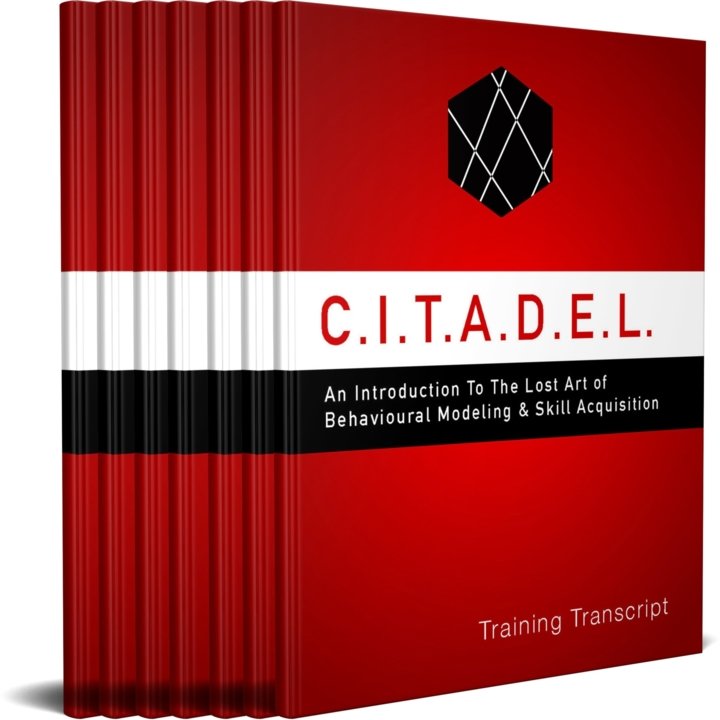
12 Training Transcripts
VALUE: $497.00
Full transcripts of the core 9 modules (19+ hours of video content) and 3 masterclasses (approximately 90 minutes each) will be in your member’s area soon when you join C.I.T.A.D.E.L.
(Note: Transcripts of the first two modules are already waiting for you…)
You’ll highlight key ideas, turn them into action steps, and take your own notes into margins.
PLUS, a written version of the entire program will give you a chance to review everything at your own pace using a different input channel.
24+ Skill Building Experiments and Supplementary Notes
VALUE: $497.00
To really help you hone your modeling skills, here's a list of some of the experiments:
- "Seeing What The Brain Misses..."
- "Catch & Release"
- "It's All In The Way You Move..."
- "OMR: Become Better At Tracking."
- "Peter Pattern"
- "Get It In The Muscle"
- "What's Driving it?"
- "Eye Witness"
And, MORE…
All-new stuff for this C.I.T.A.D.E.L program.
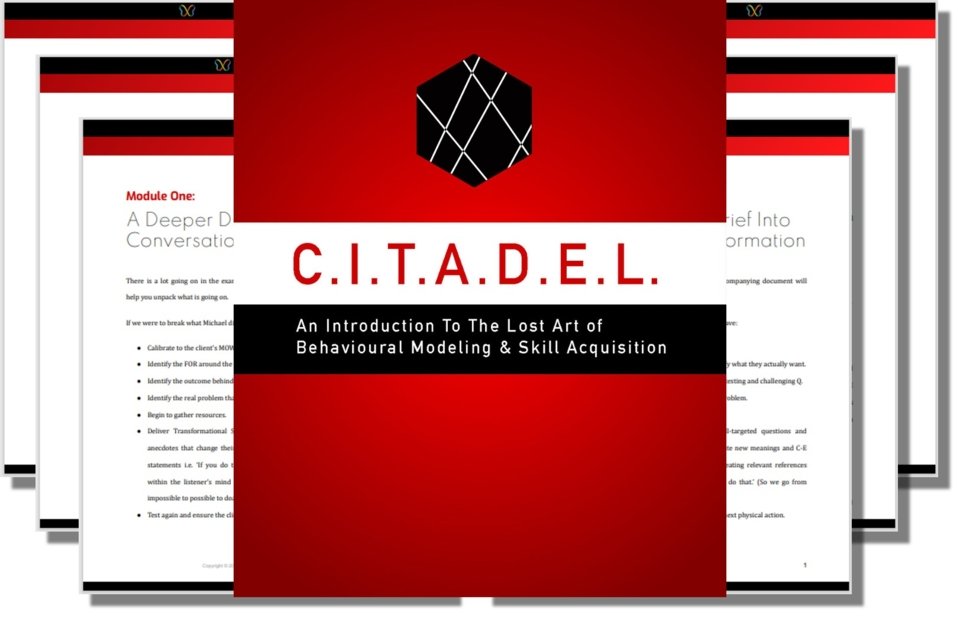
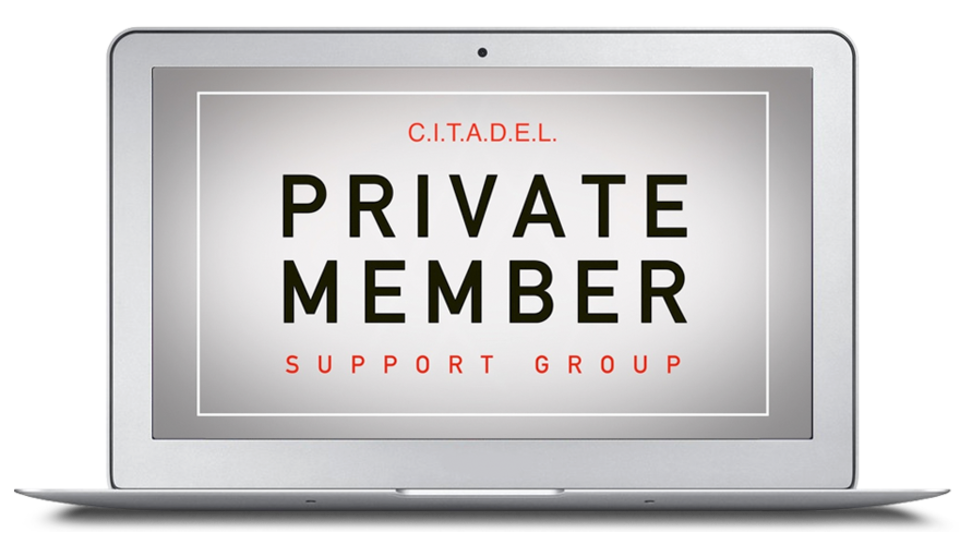
Closed Member Support Group
VALUE: $250.00
You'll have access to a closed member group support within the training portal where you can submit questions directly below videos and get additional support and feedback whenever you need.
PLUS, Michael and I have agreed to record additional videos and create additional resources to support our students where we’ve had requests for deeper dive on a commonly requested topic.
And To Make This An Easy
Decision For You, We Are Ready
To Walk The Extra Mile...
If you join C.I.T.A.D.E.L. today, you’ll also get:
Bonus #1:
Foundations Of Artificial Design & Subtractive Modeling
VALUE: $500.00

A masterclass that teaches the foundations of artificial design and secrets of Subtractive Modeling so that you can come up with the optimized designated pattern for transfer.
Modeling can be arranged into seven steps: The C.I.T.A.D.E.L. process.
The core program above covers steps 1-5 in depth. This based on our research, is the area most people are interested in and what allows you to identify a true exemplar(s) and code a preliminary model based on their behaviour so you can produce a similar class of result.
When you’ve developed your skills in each of these five areas you’ll be well on your way to transforming your ability to model and master new skills far quicker.
Compressing the learning curve and accelerating the tempo to mastery will be within your reach.
But for those of you looking to transfer your model to others, the modeling process doesn’t stop there.
Once you’ve created and tested your preliminary model it’s time to eliminate the non-essential.
Even the best of the best can do steps that are non-necessary!
This is where our bonus masterclass “Foundations of Artificial Design & Subtractive Modeling” comes in.
During this live masterclass Michael’s going to teach:
This masterclass is PRICELESS because it’s a topic that Michael will reveal for the first time in front of the camera.
Bonus #2:
Learning Transfer Foundations
VALUE: $500.00
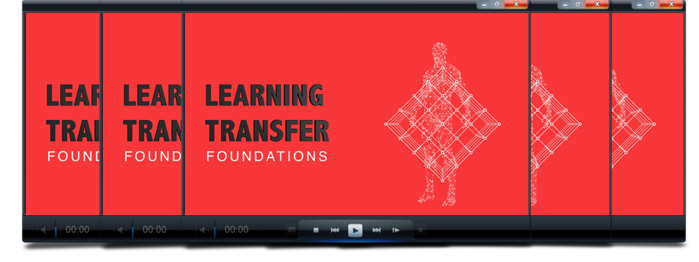
A masterclass that teaches key principles and strategies that need to be considered for effective learning transfer.
You’ve got your model. You’ve streamlined it. You’ve can use it to create the same class of result as your exemplar.
But…
Have you fully thought through how you’re going to transfer and teach your model to others?
Unfortunately, even “expert”’ modelers frequently fall down at this step.
But you’re going to learn these essential secrets in this masterclass with Michael Breen:
By the end of this training, you’ll know more about modeling and how to do it than 99.9% of NLPers, and most importantly will have the foundation skills to go and apply it on your own projects.
This masterclass is PRICELESS because it’s a topic that Michael will reveal for the first time live and on video -- just for C.I.T.A.D.E.L. students.
Bonus #3
Ask Michael Anything on Modeling:
VALUE: $250.00
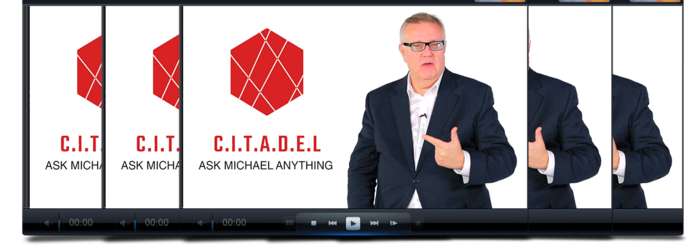
That’s why you also get exclusive access to the Ask Michael Anything video masterclass where Michael answers the most pressing questions about modelling that were submitted by our inaugural customers.
Normally, as I’ve said before, Michael is very closed-lipped about his modelling work and how the process works, but as a member of C.I.T.A.D.E.L. you’ll be part of our exclusive insider-only group -- if you’ve got questions, we’re here to give you insights, experiments to try and clearly explained answers you can use right away.
Your Investment
(Once In A Lifetime Opportunity)
Just tell me:
What would it mean for you to *finally* discover a proven framework that gives you a thorough introduction to behavioral modeling and rapid skill acquisition from one of the field's most exceptional teachers AND experienced commercial practitioners of this lost art?
What would it mean to acquire this awesome set of rare and special skills so can learn (almost anything) quicker, easier and with far less trial and error?
What would it mean if you could accelerate the time to mastery, find somebody who is already getting the results you want in a specific area, figure out how they do it and create the same class of result?
What would it mean to have “X-ray vision” insights about people around you -- family members, friends, team members, clients -- and see their desires and obstacles better than anyone else can?
What would it mean to create an empowering learning environment for your kids and spouse and synergistically grow as a couple and as a family?
And, most importantly…
If you’ve ever been there…
If you’ve ever doubted yourself after trying so many different books and courses WITHOUT achieving your desired results…
If you’ve ever got into a fight with your spouse for not being where you want to be in your life DESPITE all your efforts in learning and improving…
What would it mean for you to get out of that vicious circle of continuous learning… that typically leads to a circle of continuous wishing, hoping and wanting… and all the misery and heartbreaks that come from constantly wanting something but never realising the skills you need to have it?
You may know that it’s almost impossible to put a price tag to finally finding a solution to all those problems and all the others that surround you.
Yet, let’s think of the logistics of earning this wisdom.
If you were to come to London for a 5-day event with Michael Breen on an ADVANCED topic like this one, modeling -- a topic Michael has never covered in such depth…
It would easily cost you £5,000 GBP (which is about $6,500 USD).
Plus all the travelling and accommodation fees.
But I’m NOT going to ask you to pay $6,500 USD or more.
(Although it’d be totally worth it).
And I’m NOT going to play the “price dropping” game with you.
That’s because C.I.T.A.D.E.L. is easily the most important program we’ve ever released.
It’s the first program to ever reveal the much bigger picture of how to model.
The nitty-gritty that other offerings on NLP modeling miss.
The stuff that got lost along the way.
The exact steps that are put together in a practical way for the first time ever.
And before I tell you how to get access to this rare groundbreaking program, I want to tell you another lie that is often inferred in the personal development industry:
Skills are NOT bought.
They are earned through instruction and practice.
Master Trainer Michael Breen provides expert training and a step-by-step process for you to get the foundational skills in this program, but as with any skill, you'll need to do the practice.
So with that said let me tell you this:
While this program has a real-life value of $6,994 USD, if we were to offer it in a seminar setting, it’s because C.I.T.A.D.E.L. is a digital product with opportunities to ask your questions to Michael and me (more on that in a minute…)
Your investment will only be $2,997 today.
(You save over $3,997 instantly).
People who have practical skills in NLP, who want to learn how to shorten the learning curve (dramatically) and are eager to learn the one skill that changes everything else you'll ever do as a learner.
If that's you, we'd love to have you join this program.
Here's a Quick Recap
of Everything That's Included
What You'll Receive | VALUE ($) |
|---|---|
Module 1: Modeling Fundamental | $500.00 |
Module 2: Misconceptions, Myths & Misunderstandings | $500.00 |
Module 3: Secrets Of Selection How To Identify True Outliers | $500.00 |
Module 4: Must-Have Modeling Tools, Techniques & Frameworks (Part 1) | $500.00 |
Module 5: Secrets Of Pattern Detection | $500.00 |
Module 6: Structuring Modeling Projects | $500.00 |
Module 7: Must-Have Modeling Tools, Techniques & Frameworks (Part 2) | $500.00 |
Module 8: Cut The Cloth To Measure | $500.00 |
Module 9: Bringing It All Together | $500.00 |
12 Training Transcripts | $497.00 |
24+ Skill Building Experiments & Supplementary Notes | $497.00 |
Private Member's Group Portal | $250.00 |
Bonus 1: Ask Michael Anything | $250.00 |
Bonus 2: Foundations of Artificial Design & Subtractive Modeling | $500.00 |
Bonus 3: Learning Transfer Foundations | $500.00 |
Total Value: |
|
Today Just: | $2,997! |
You Can't Lose
Try 'C.I.T.A.D.E.L.' For a
Full 30 days, 100% Risk Free...

To completely take away any risk for you I'm going to give you an unbeatable
30-day Money Back Guarantee.
You don't have to decide today if CITADEL is for you,
take it for a test drive for 30 days.
That’s right.
If you’re not 110% happy with C.I.T.A.D.E.L. for any reason… you can get every single penny back within 30 days of your purchase. No questions asked.
You have a full 30 days to try it out.
There’s simply no way you can lose.
Go through the modules. Do the exercises. Ask questions in your member’s area.
Put your new learnings into practice.
And then decide if you want to keep the product or not.
As easy as that.
There are no strings attached.
Honestly, I’m not worried at all about you asking for a refund…
Because that is how MUCH I believe in this course -- C.I.T.A.D.E.L. is one of the most monumental products in the history of NLP Times (probably the most).
It’ll be a game-changer for your business life as well as personal life.
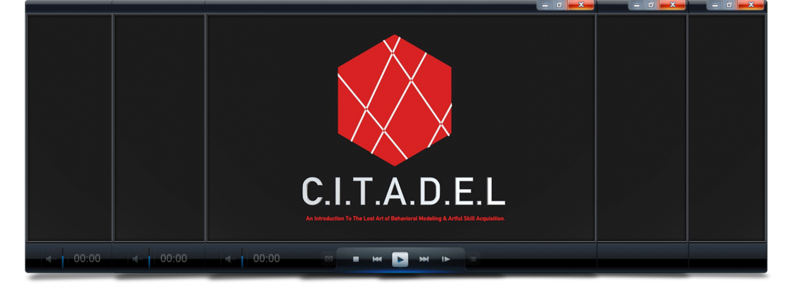
When I enrol today I'll get:
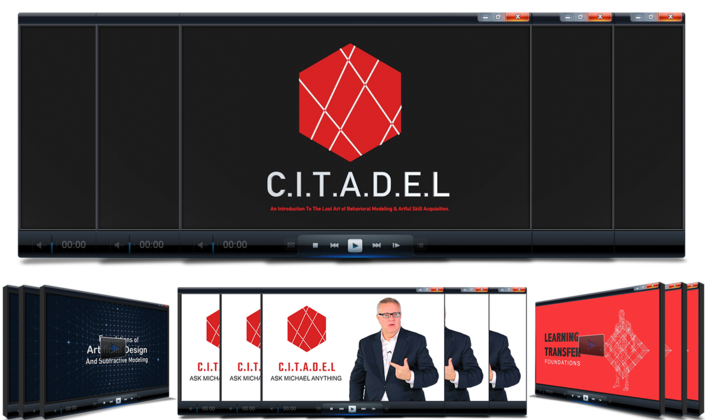

Secure Your Spot Now.
Total Value: $6,994.00
Just $2,997!
Have questions? Click here to chat with our specialist.
P.S. C.I.T.A.D.E.L., for me, is all about legacy.
I got into NLP because I wanted to make my life and the life of the people I care about better.
But once I started down that path, I realised there were huge gaping holes in how NLP was being taught. (And still is by many).
There is lots of talk about modeling…
...and inspirational stories about the early modelers in NLP…
...but VERY little on “how to” actually do it.
So I decided to commit more than a decade of my life to creating a new breed of products with my friend and colleague Master Trainer Michael Breen…
...so those who really wanted to learn the skills of NLP could get the skills taught clearly, in the right order, from a true master of NLP.
But there was a problem…
We couldn’t start off with teaching modeling because -- well -- it’s an ADVANCED application of NLP and our goal was to help as many people of possible develop real-life skills with the tools to help their lives.
I hope we have, in some small way, helped do that for you.
Now that we feel we have trained enough people around the world in real skills of NLP…
...it was time for C.I.T.A.D.E.L.
...our most exciting program yet.
This is truly the “missing masterclass” on behavioural modeling that Michael has never taught publically or even privately. (That’s right. Not even to small groups behind-closed-doors).
It took years of work, tens of thousands of hours developing dozens of other products before I could get him to agree to teach this life-changing skill to the NLP Times community.
And I sincerely believe C.I.T.A.D.E.L. will mark a monumental moment in your life.
Again, let’s not be intrigued by the urgency of this offer.
Having limited spots is not a marketing ploy -- it’s just a way for me to ensure that…
a) Michael and I can give this important program and all the students participating the attention that they deserve,
b) We can attract the right people who are interested in making the most of these groundbreaking principles and strategies that Michael has spent his entire career developing and refining.
As I said before… this program is all about “legacy” for me.
And if you want to be a part of this legacy, click here to join now.
Frequently Asked Questions
Did we miss your question? Click here to chat with our specialist.
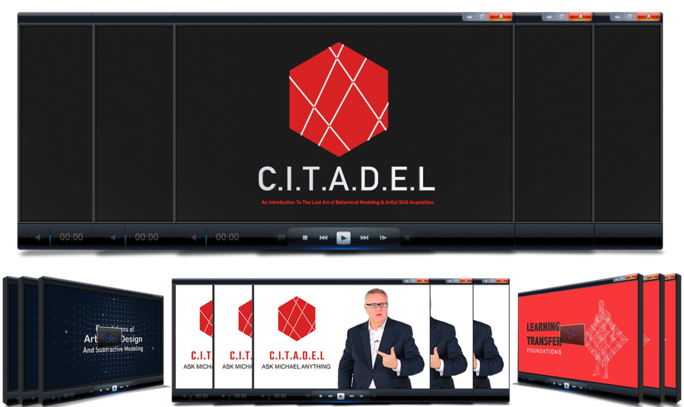

Secure Your Spot Now.
Total Value: $6,994.00
Just $2,997!
Have questions? Click here to chat with our specialist.
Copyright © 2022 NLP Times. All Rights Reserved.
















